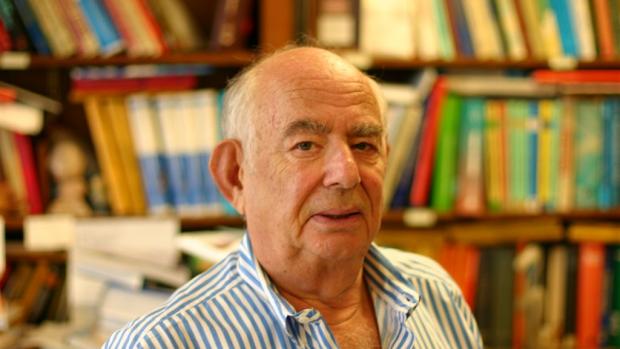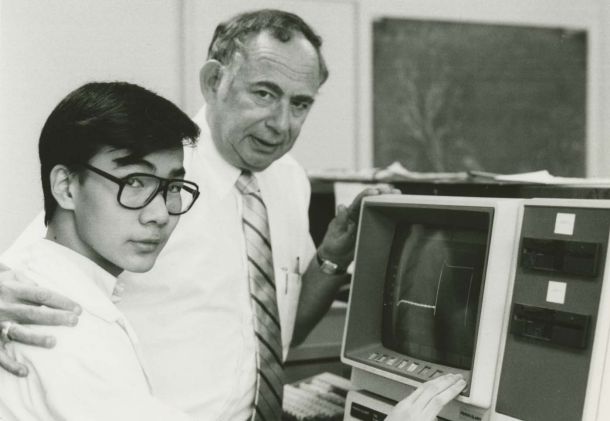In Memoriam: Eli Pearce

When Professor Eli Pearce passed away on May 19, 2015, a slice of Poly history passed along with him. Pearce had been affiliated with the school, then known as the Polytechnic Institute of Brooklyn, since the mid-1950s, when he conducted his doctoral studies in chemistry here. As a student, he learned with such luminaries as Herman Frances Mark, who is often called the Father of Polymer Science, and Charles Overberger, another influential chemist who helped establish the study of polymers as a major sub-discipline.
In recent years, Pearce had been one of the few remaining figures at the School of Engineering with firsthand memories of the men, and even as his health worsened, he took great pleasure in traveling from his home in downtown Manhattan to the MetroTech Center, to help the archivist at the Bern Dibner Library organize the Herman Mark collection. (So engaging was Mark that attending one of his classes was just as good as going to the theater, Pearce would say, and he encouraged anyone visiting the school to go see the bronze plaque installed when Mark’s Polymer Research Institute was named a National Historic Chemical Landmark.)
Pearce was born in Brooklyn on May 1, 1929, to parents who had emigrated from Russia. (His last name was originally Perlmutter, but he changed it later in life to avoid being the target of anti-Semitism in the work world.) Although his parents had not been able to attend college, they extolled the value of education to him, and he earned a bachelor’s degree from Brooklyn College (1949) and a master’s degree from NYU (1951) before entering Poly. (He also served from 1953 to 1955 in the U.S. Army, conducting biochemical research on steroid metabolism.)
He felt immediately at home at Poly. Like him, many of his classmates were first-generation college students, and in later decades, after he had joined the faculty, he found it gratifying that the school was still devoted to educating the sons and daughters of immigrants. “I feel a kinship with them,” he once said. “A hands-on, practical field like engineering provides them with a way to enter the middle class and, eventually, beyond.” He noted that his own children had no such worries, with one becoming a professor of law and one a psychologist. His grandchildren, he quipped, were now free to become poets if they liked.
Between earning his doctoral degree in Poly in 1958 and joining the faculty in 1974, Pearce worked in industry. In 1958 he began conducting research on polyamide melt blends at DuPont’s Carothers Laboratory, and in 1962 he became a section manager at J.T. Baker. In 1968, he signed on as a manager at Allied Chemical, where he worked with flame retardants, among other innovative technologies. Although Pearce dealt with the looming specter of anti-Semitism and the harsh realities of office politics, he believed in stressing the positive. At one company, he recalled, he was tasked with making recommendations on how the company was being run. After he recommended firing certain executives, he instead found himself fired. With two young children to support, he could have sulked or panicked. However, he had always been an active networker, particularly within the American Chemical Society, and within a few weeks he had won an even better job, as director of the Camille Dreyfus Laboratory at the Research Triangle Institute, in North Carolina.

Mark invited him to teach at Poly in 1974, and Pearce became a much-loved professor and respected researcher here. During his tenure, he directed the Polymer Research Institute that Mark had founded from 1981 to 1996, served as a dean from 1982 to 1990, published more than 250 papers, did seminal research into hydrogen bonding in polymer blends, filed several patents, and won a host of laurels, including the 1992 Paul J. Flory Polymer Education Award, the 2006 H. F. Mark Medal from the Austrian Research Institute for Chemistry & Technology, and an ACS Fellowship in 2009. (Pearce had served as ACS president in 2002 and director-at-large on the ACS Board of Directors from 1999 until 2000 and again from 2001 until 2003. In 2014 the group named him an inaugural “Rock Star of Chemistry,” an honor that he joked was appropriate, as he had been quite a good dancer in his youth.)
Of all those achievements, Pearce was most proud, he sometimes said, of helping launch a movement to get more women and minority members involved in chemistry. (Pearce was a strong supporter of the ACS Committee on Minority Affairs and the ACS Scholars Program.) “It’s hard to fathom, but the numbers are now flipping,” he marveled the year before his death. “More women than men are now becoming chemists.” He credited his enlightened attitudes to his late wife, Judith, to whom he was married for 32 years. “She had quite modern sensibilities,” he explained. “During a period when it was unusual for a woman to have a job outside the home, she became a social worker, and she was very accomplished.”
The condolences of the entire university community go to his son, Russell; his daughter, Debra Pearce-McCall; his stepson, Michael Ruby; his stepdaughter, Elizabeth Ruby Lyden; and his many grandchildren.
“Eli exemplified all one could wish for in a teacher, researcher, and colleague,” Katepalli Sreenivasan, the Dean and President of the NYU Polytechnic School of Engineering, said. “His brilliance, humor, kindness and willingness to engage his colleagues touched everyone who knew him, and we were very fortunate to call him one of our own.”
To honor Pearce’s dedication to diversity in his field, donations can be made in his memory to the American Chemical Society Scholars Fund, which provides aide to African-American, Hispanic or Native American chemistry students, at acs.org/content/acs/en/about/makedonation.html.

